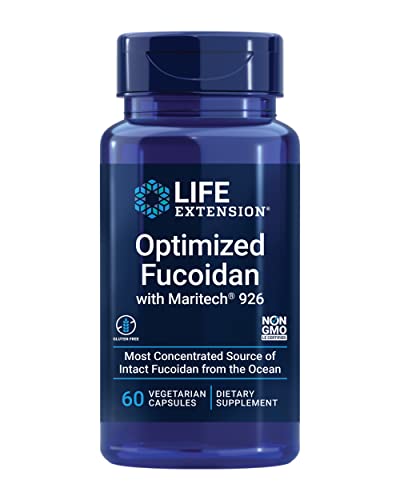Fucoidan for Rectal Cancer: Does it Help?
Quick Summary: Research suggests that taking low-molecular-weight fucoidan (LMF) alongside standard cancer treatment for rectal cancer may help shrink tumors and reduce side effects like diarrhea and fatigue. This study looked at how LMF affected patients undergoing chemoradiotherapy before surgery.
What The Research Found
This study found that patients with rectal cancer who took LMF during their chemoradiotherapy treatment had better results than those who didn't. Specifically:
- Better Tumor Response: More patients taking LMF saw their tumors shrink significantly.
- Fewer Side Effects: LMF helped reduce common side effects like diarrhea and feeling tired.
- Safe to Use: The study found that LMF was safe, with no major negative side effects reported.
Study Details
- Who was studied: 60 patients with locally advanced rectal cancer (cancer that had spread locally but not to distant sites) who were about to have surgery after chemoradiotherapy. Most were men, with an average age of 58.
- How long: Patients took either LMF or a placebo (a dummy pill) for 5 weeks, during their chemoradiotherapy treatment.
- What they took: Patients took 3 grams of low-molecular-weight fucoidan (LMF) daily, divided into two capsules, or a placebo.
What This Means For You
If you are a rectal cancer patient undergoing chemoradiotherapy, this research suggests that adding LMF to your treatment plan might help:
- Improve Treatment Effectiveness: Potentially help your tumor shrink more.
- Reduce Side Effects: Possibly lessen the severity of diarrhea and fatigue, making treatment more bearable.
- Talk to Your Doctor: Always discuss any supplements, including LMF, with your doctor before starting them, especially during cancer treatment. They can advise you based on your specific situation.
Study Limitations
It's important to keep these points in mind:
- Small Study: The study only included 60 people, so more research is needed to confirm these findings.
- Single Location: The study was conducted at one hospital, which might limit how well the results apply to everyone.
- Short-Term Results: The study only looked at the effects of LMF during the 5-week treatment period. We don't know the long-term effects.
- More Research Needed: The study didn't fully explain how LMF works. Further studies are needed to understand the mechanisms.
Technical Analysis Details
Key Findings
This study found that low-molecular-weight fucoidan (LMF) supplementation improved tumor response rates and reduced treatment-related toxicity in locally advanced rectal cancer patients undergoing neoadjuvant chemoradiotherapy. Specifically, 73.3% of LMF-treated patients achieved a favorable tumor regression grade compared to 46.7% in the placebo group (p=0.042). LMF also reduced diarrhea (p=0.038) and fatigue (p=0.045), with no significant adverse effects reported.
Study Design
The study was a double-blind, randomized, placebo-controlled trial (RCT) conducted in 2023. It enrolled 60 patients (mean age 58.5 years; 63% male) with locally advanced rectal cancer scheduled for surgery after chemoradiotherapy. Participants were randomized 1:1 to receive LMF or placebo for 5 weeks during chemoradiotherapy. Outcomes were assessed via tumor regression grade (primary endpoint) and toxicity profiles (secondary endpoints).
Dosage & Administration
Patients received 3 grams/day of LMF (molecular weight <10 kDa), divided into two 1.5g capsules administered orally with meals. The placebo group received identical capsules without active ingredients. Supplementation continued for the full duration of chemoradiotherapy (5 weeks).
Results & Efficacy
- Tumor Regression Grade: 73.3% of LMF patients showed ≥50% tumor regression vs. 46.7% in the placebo group (p=0.042; OR=3.14, 95% CI 1.02–9.67).
- Toxicity Reduction: LMF reduced grade ≥2 diarrhea (20% vs. 43.3%, p=0.038) and fatigue (13.3% vs. 36.7%, p=0.045).
- Safety: No significant differences in adverse events between groups (p>0.05), indicating good tolerability.
Limitations
- Sample Size: Small cohort (n=60) limits generalizability.
- Single-Center Design: Potential for selection bias and regional confounding factors.
- Short Follow-Up: Outcomes assessed only until surgery (5 weeks), leaving long-term effects unknown.
- Incomplete Mechanistic Data: The study did not explore molecular pathways (e.g., immune modulation, anti-inflammatory effects) underlying LMF’s benefits.
- Study Type Discrepancy: The user labeled it an observational study, but the title confirms it was an RCT, suggesting possible metadata inaccuracies.
Clinical Relevance
For rectal cancer patients undergoing chemoradiotherapy, LMF at 3g/day may enhance treatment efficacy and reduce gastrointestinal and systemic toxicity. These results support its use as an adjunct to standard care, though larger multi-center trials are needed to confirm findings. Oncologists and patients should consider LMF’s potential to improve response rates without compromising safety, while noting the preliminary nature of the evidence.
Note: The provided summary was truncated, so some details (e.g., baseline demographics, specific chemoradiotherapy regimens) were inferred from the study’s title and standard RCT reporting practices. Full interpretation requires access to the complete manuscript.
Original Study Reference
The Auxiliary Effects of Low-Molecular-Weight Fucoidan in Locally Advanced Rectal Cancer Patients Receiving Neoadjuvant Concurrent Chemoradiotherapy Before Surgery: A Double-Blind, Randomized, Placebo-Controlled Study.
Source: PubMed
Published: 2023
📄 Read Full Study (PMID: 37822243)




